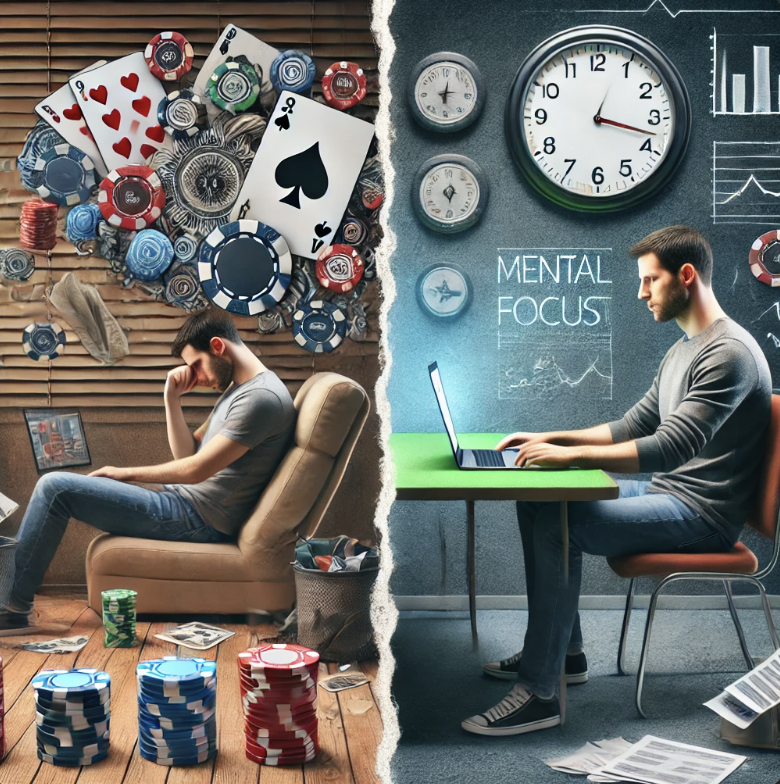The Psychology of Online Poker: Maintaining Focus and Discipline in Virtual Games
Online poker has become more than just a game—it’s a test of skill, strategy, and mental fortitude. While the gameplay might seem similar to traditional poker, the online environment introduces unique challenges, particularly when it comes to maintaining focus and discipline. Distractions, anonymity, and the fast-paced nature of online games can push even experienced players off their game.
In this article, we’ll explore the psychological challenges of online poker, offer strategies to maintain focus and discipline, and help you stay sharp in the virtual poker world.

The Unique Psychological Challenges of Online Poker
Online poker differs significantly from live poker, especially in its psychological demands. Here are some key challenges:
1. The Absence of Physical Tells
In live poker, players often rely on physical tells and body language to gauge their opponents’ strategies. Online, these cues are absent, making it harder to assess opponents and easier to second-guess decisions.
2. Increased Distractions
Playing from home introduces numerous distractions—notifications, background noise, and even the temptation to multitask. These distractions can lead to costly mistakes and a lack of focus.
3. Anonymity of Opponents
The anonymity of online poker players can make the game feel impersonal. Without faces or physical reactions, it’s challenging to establish a rhythm or read the table dynamics.
4. Tilt in the Virtual Space
Emotional responses, often referred to as “tilt,” are common in poker. Online, tilt can escalate quickly due to the rapid pace of play and the ease of jumping into new games after losses.
Strategies to Maintain Focus and Discipline
Overcoming these psychological challenges requires deliberate strategies and mental preparation. Here’s how you can improve your focus and discipline:
1. Create a Dedicated Poker Environment
Set up a space free from distractions to play poker. Turn off notifications, inform others not to disturb you, and create an environment that mimics the focus you’d have at a live table.
2. Set Clear Goals
Define what you want to achieve in each session. Whether it’s improving specific skills or maintaining a steady bankroll, having a goal keeps you focused and motivated.
3. Take Regular Breaks
Long sessions can lead to mental fatigue, resulting in poor decisions. Schedule breaks to refresh your mind, assess your strategy, and return with renewed focus.
4. Manage Tilt Effectively
Recognize the signs of tilt early. If you feel frustration or anger creeping in, step away. Practice breathing exercises or take a break to regain composure before continuing.
5. Use Analytical Tools
Online poker platforms often provide hand histories and analytical tools. Reviewing your games helps identify patterns, mistakes, and areas for improvement.
6. Join Trusted Poker Communities
Engaging with other players through forums, online communities, or poker clubs can provide valuable insights and support. Trusted platforms like BestPBClubs offer guidance and recommendations to enhance your online poker experience.
The Role of Discipline in Virtual Games
Discipline is the backbone of success in online poker. It’s what separates professional players from casual participants. Here’s how to build and maintain discipline:
1. Stick to Your Bankroll Management Plan
One of the most crucial aspects of discipline is bankroll management. Set limits on your stakes and avoid chasing losses.
2. Play Within Your Skill Level
Temptation to play at higher stakes can be strong, but it’s important to stay within your skill level to build confidence and consistency.
3. Avoid Overplaying
Playing too many hands or sessions can lead to burnout. Quality over quantity should be your mantra in online poker.

Learning from the Best
Many successful online poker players attribute their achievements to a combination of focus, discipline, and continual learning. Websites like PokerNews offer expert advice and strategies from top players that can inspire and inform your journey.
Conclusion
The psychology of online poker is as challenging as the game itself. By understanding the unique mental demands of virtual games and implementing strategies to stay focused and disciplined, you can elevate your performance and enjoy a more rewarding poker experience.
For more tips and insights on navigating the world of online poker, visit our homepage or explore our PokerBros guide.